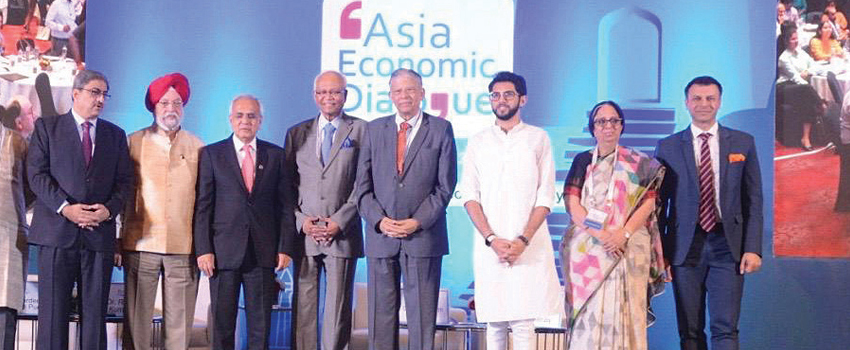Contemporary Geo-Economics great learnings

It is time that Asian economic discussions are centred in Asia and not in a freezing and expensive place like Davos, and if the dialogue has to be in Asia, who not India and if India why not Pune? And Pune it was! An insight into the even
Does India face the risk of isolating itself economically though its policy of shunning Free Trade Agreements and even Regional Agreements like R-CEP while it makes its case for multilateral free trade agreements? Is the decline of the WTO inevitable and will new forms of trade emerge between countries as the ugly walls of protectionism keep going up and export led economic growth becomes more complicated in current times? And what should we, as ordinary citizens of the world, worry about at a time like this?
All this and more were up for discussion at a “By Invitation Only” packed Asian Economic Dialogue summit at a city hotel end of February. The Pune International Centre, which has a stellar track record of bringing movers and shakers from all parts of the country and the world to share their ideas with city audiences mounted this summit in partnership with the Ministry of External Affairs and attracted brilliant speakers industrialists Uday Kotak and Baba Kalyani; economists Krishnamurthy Subramanian, Bibek Debroy, Rajiv Kumar, Kishore Mahbubani and Urjit Patel; politicians Hardeep Puri, Aditya Thackeray and Suresh Prabhu; Diplomats, Ambassadors to the WTO from India and China, former Ambassadors and of course the hosts, Minister Jaishankar, Dr Vijay Kelkar and Dr Raghunath Mashelkar. An event that would compare favourably with the best in the world and far surpasses the best of India.
A key learning from the format of this summit was the event curation. With an inaugural panel that featured the Chief Economic Advisor and industry and Government leaders and passionately postulated the need for the twin forces of markets and trust to enable robust economic growth and a fireside chat with Uday Kotak, arguably the foremost business and economic strategist in the industry today, the first evening of the summit itself set a scorching pace for debate and deep insights. The second day saw discussions on the diminishing status of the WTO, the importance of Global Value Chains and Regional Cooperation with each session featuring a theme paper presented by a global expert in that subject area.
Bibek Debroy, the humorous and lively Chairman of the Prime Minister’s Economic Advisory Council talked about the need for integration into Global Value Chains (GVCs) and suggested that it was the responsibility of the entire eco-system including industry to spread the production and distribution footprint across geographies. The presence of China’s Consul General in Mumbai, Tang Guocai and his strong statements on China’s actions to control the spread of the COVID-19 Coronavirus would have reassured many that the disruption caused by this unexpected threat would hopefully be temporary. The Chinese Ambassador to the WTO, Zhang Xiangchen reinforced Asia’s commitment to the dialogue and the Chinese Ambassador seemed to concur with Indian Permanent Ambassador to the WTO, J. S. Deepak in pressing for the need for more voice for developing nations in an increasingly protectionist environment. There were concerns expressed at the developed nations taking advantage of their current status to impose restrictions on consensus building for the future by removing provisions that provide some flexibility to developing nations in the WTO rules.
If the dialogue has to be in Asia, why not India and if India whynot Pune?
The star speakers of the summit, apart from industry friends Baba Kalyani, Uday Kotak and Bhavish Agarwal were undoubtedly Dr. Mohan Kumar, former Indian Ambassador to France and Bahrain and India’s lead negotiator at GATT and then WTO, now a leading academic and research agency leader and the formidable Kishore Mahbubani, the Founding Dean of the Lee Kuan Yew School of Public Policy at the National University of Singapore. The latter two enthralled economists, industry CEOs and even social sector leaders in the audience by their eloquence and the lucidity with which they demystified complex economic and global trade technicalities and presented their views on how India could build a great future. As Mr. Mahbubani rightly said, a former President visited China decades ago to sign multiple trade deals and position China as a counterpoint to Russia at the height of the cold war. Recently, President Trump has wooed India with the same objective to be a balancing force to the growing economic political dominance of China, but the world has changed and so has America. India will have to fight for the big trade deals it hopes to sign with the US. But with our cultural competence and large population leverage, we can still prevail.
An excellent summit, the brainchild of Dr Kelkar and Dr Mashelkar with dynamic leadership from Ambassador Gautam Bambawale and support from some of us on the committee has proved that it just takes will power to put India and Pune on the World map. As one of the top CEOs of India Inc pointed out, it is time that Asian economic discussions are centred in Asia, not freezing and expensive place like Davos, and if the dialogue has to be in Asia, why not India and if India why not Pune? Indeed, as two of my IT leader friends commented on social media, a line up of speakers like this in Pune from all over India and the world could never have been imagined a few years ago. Truly PIC is putting Pune on the world map!